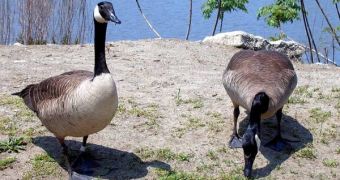In measures spurred by the January incident, when an airplane hit a flock of large birds and was forced to land on the Hudson River, authorities in New York City decided to kill at least 2,000 geese this year, all of them living in close proximity to the LaGuardia and JFK international airports. City Hall is collaborating with Port Authority on this assignment, and this combined force plans to remove all Canadian geese on a several-mile radius around the two airports.
Large birds flying in flocks are extremely dangerous for airplanes. If they get hit, or the birds slip into the engines, they can cause extensive damage, leading to the crashing of the plane. This is what happened in January, when the pilot of a plane that had just taken off from NYC was the only thing standing between the passengers and certain death. After hitting what was later identified as a flock of Canadian geese, the man steered the plane on an unusual path, and landed it safely in the freezing waters of the Hudson. None of the passengers died during this operation.
“The serious dangers that Canada geese pose to aviation became all too clear when geese struck US Airways Flight 1549. The incident served as a catalyst to strengthen our efforts in removing geese from – and discouraging them from nesting on – city property near our runways,” said on Thursday the Mayor of NYC, Michael Bloomberg, in a press conference announcing the aggressive plan against the birds. This is not the first set of such measures taken by the NYC City Hall. Some 1,200 geese have been netted and gassed over the past six years on islands around the city, but that seems to be insufficient.
“Research has shown that resident Canada geese in several New York studies stay within five miles of a particular location and that 74% of wildlife strikes occur at or near the airport," said Martin Lowney, who is the director of the US Department of Agriculture Wildlife Services program in New York. The USDA will team up with Port Auhtority and City Hall, and all three will share the costs of this operation, The Daily News reports. At this point, authorities, together with wildlife officials, are trying to figure out the best time to act on the birds.

 14 DAY TRIAL //
14 DAY TRIAL //